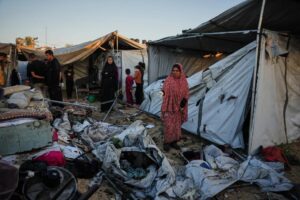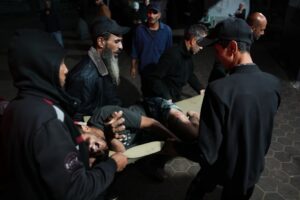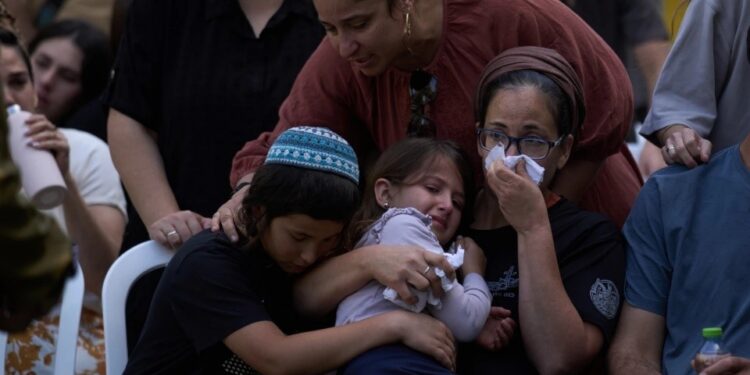Israel’s military said Wednesday that the ceasefire was back on in Gaza after it carried out heavy airstrikes overnight across the Palestinian territory that killed 104 people, including 66 women and children, according to local health officials.
The strikes, the deadliest since the ceasefire began on Oct. 10, marked the most serious challenge to the tenuous truce to date.
The bombardment pointed to Israel’s readiness to strike hard at what it says are Hamas violations of the ceasefire deal. Meanwhile, the militant group denies it is responsible and blames Israel for violations.
The death toll in Gaza from overnight Israeli strikes has climbed to 81, hospital officials said Wednesday. Previously, at least 60 people, including many children, were reported killed in what is likely the most serious challenge to the tenuous ceasefire deal in Gaza since it came into force earlier this month.
After it announced the restoration of the ceasefire, the Israeli military said it carried out another airstrike in northern Gaza, targeting what it called a site where weapons were being stored for an imminent attack. Al-Shifa Hospital in Gaza City said it received two bodies from the strike.
The latest violence puts new strains on American pressure to keep the ceasefire on track. U.S. President Donald Trump defended Israel’s strikes but also insisted the escalation won’t wreck the truce.
Israel said its overnight strikes were in retaliation for the shooting and killing of an Israeli soldier in Rafah, the southernmost city in Gaza. Prime Minister Benjamin Netanyahu also said Hamas violated provisions in the deal concerning the handover of the remains of hostages.
Hamas denied any involvement in the deadly shooting and, in turn, accused Israel of “a blatant violation of the ceasefire deal.” It also said it would delay handing over the body of another hostage to Israel because of the strikes.

Deadly strikes across Gaza
The strikes across Gaza in the early hours of Wednesday pounded buildings and tent camps housing displaced families.
Ambulances and small trucks carrying bodies crowded hospital entrances. In Deir al-Balah, bodies were wheeled in on stretchers or carried on mattresses. One man walked into a hospital holding the body of a young child.
“They burned children while they were asleep,” Haneen Mteir, whose sister and nephews were killed in a strike, shouted at the morgue in Nasser Hospital in the southern city of Khan Younis.
The Palestinian Health Ministry said at least 104 people, including 20 women and 46 children, were killed in the overnight strikes and 253 people were wounded, most of them women and children.
Israel’s military said Wednesday that the ceasefire was back on in Gaza after it carried out heavy airstrikes overnight across the Palestinian territory that killed 104 people, including 66 women and children, according to local health officials.
The Israeli military said in a statement Wednesday that it struck dozens of Hamas targets, including individuals, observation posts, weapons depots, mortar firing positions, and tunnels.
It said it hit many senior Hamas fighters, including 21 commanders of various levels. It said they included militants involved in the Oct. 7, 2023, Hamas-led attack on Israel that started the war, including Nukhba company commander Hatem Maher Mousa Qudra, who led the attack on the Ein Hashlosha Kibbutz, the statement said.
The military said it would continue to “respond firmly and act decisively to eliminate any threat to the State of Israel.”
Israel’s Foreign Ministry spokesperson Oren Marmorstein said Hamas was responsible for the consequences of its ceasefire violation and attributed the high death toll to the militant group using civilians as human shields.
Throughout the war, Israel has often hit targets it says are Hamas figures while in their homes or shelters where their families are also located alongside other families.

How the strikes were triggered
An Israeli military official said Wednesday that the soldier in Rafah, identified as Master Sgt. Yona Efraim Feldbaum, 37, was killed by “enemy fire” that targeted his vehicle on Tuesday.
The official, who spoke on condition of anonymity to discuss confidential military operations, said Israeli troops in the area came under attack numerous times on Tuesday as they worked to destroy tunnels and Hamas infrastructure. The Israeli military has leveled almost the entire city of Rafah over the past months, demolishing nearly every building, according to satellite photos.
Hamas insisted it was not involved in the Rafah gunfire, reiterated its commitment to the ceasefire, and called on mediators to pressure Israel to stop.






